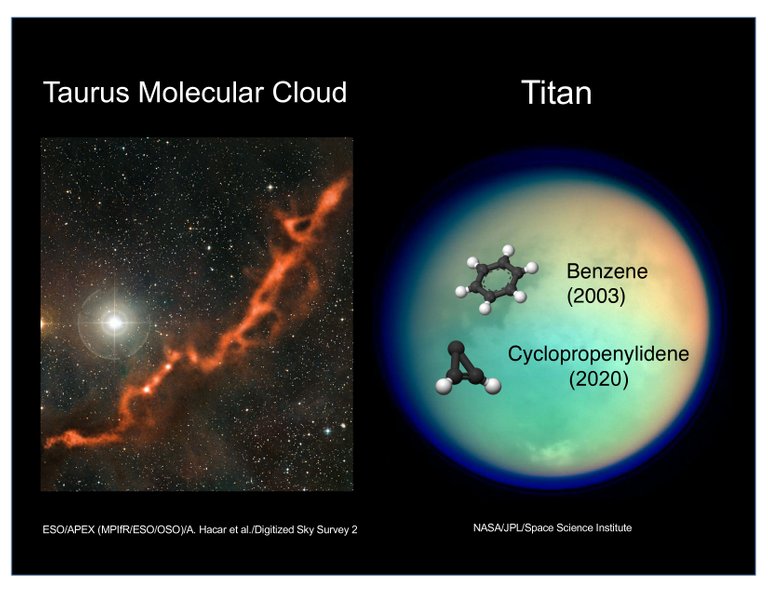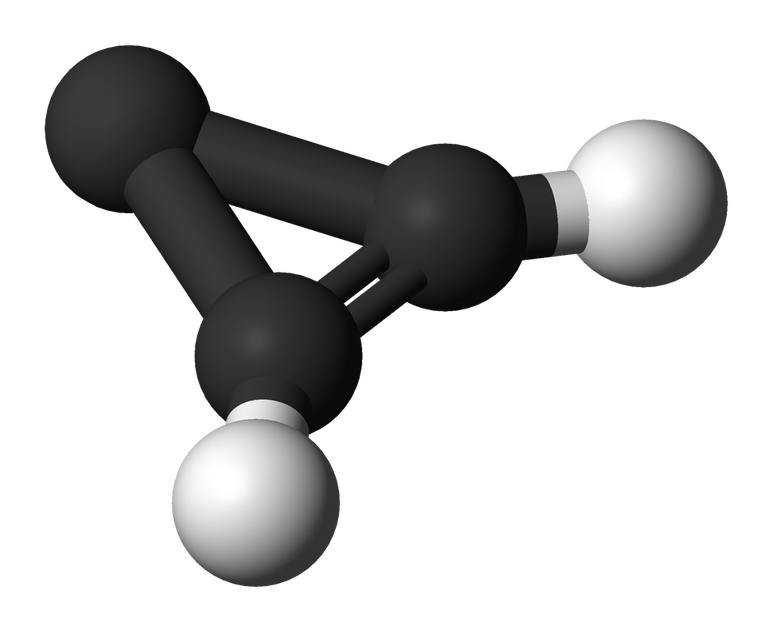Discovery of strange molecule on Saturn's moon Titan

Titan is Saturn's moon, the second largest of all the moons in our solar system. Titan's atmosphere is larger than our Earth's. Scientists have discovered strange Molecule in Titan's atmosphere. This Moleculeis called Cyclopropenylidene , or C 3 H 2 . Most of us do not know this atom. Know how we have never heard anyone discuss this type of atom anywhere. This is the new discovery of scientists. Scientists saying
This simple carbon-based molecule may be a precursor to more complex compounds that could form or feed possible life on Titan. source
Scientists found this molecule using The Atacama Large Millimeter/submillimeter Array (ALMA) is an astronomical interferometer of 66 radio telescopes. The C 3 H 2 molecule consists of carbon and hydrogen atoms. Scientists were surprised when they saw this molecule. It was an unexpected event.
Scientists have previously found these molecules in pockets throughout the galaxy. They did not expect the presence of this molecule in the atmosphere. As a result, they were surprised. The C 3 H 2 molecule can react by coming into contact with various molecules.

Galaxies contain various dust and gas particles we call nebulae. Also gas and dust can be located in different places throughout the galaxy. All these gases and dust usually contain this C 3 H 2 molecule. These regions of the galaxy are very cold and these molecules move around to cause chemical reactions
An observing team called Nixon's team searched the upper layers of the moon's atmosphere and was able to detect small amounts of C 3 H 2 on Titan because there are fewer other gases to interact with C 3 H 2 there. Scientists still don't know why cyclopropenylidene appears in Titan's atmosphere. Whereas other atmospheres do not have cyclopropenylidene. Nixon said that...
_"Titan is unique in our solar system, It has proven to be a treasure trove of new molecules." __source
_
Titan has intrigued scientists and has many similarities to Earth. Titan is the largest of Saturn's 62 moons and the second largest of all moons in our Solar System with more than 200. Actually I am also getting very curious about this moon.
Titan has a thick atmosphere 600km high and four times denser than Earth. Clouds condense here, rain falls from these clouds. The land of Titan has lakes and rivers and even a subsurface ocean of salt water. Everything is there, what do you say?
Now let's say something about the composition of Titan's atmosphere. Titan's atmosphere is made up mostly of nitrogen, about 95 percent. The remaining 5% is methane. Methane and nitrogen dissociate under the sun, revealing a complex web of chemistry. It fascinates scientists. Titan is an important NASA target for several reasons and has generated the greatest interest for research among NASA scientists.
Scientists are trying to figure out if Titan is habitable. They want to know what compounds from the atmosphere come to the surface and then whether that material can travel through the ice crust to the ocean below. Innumerable animals are living in the oceans of the Earth. So Titan's ocean could have life. Scientists are interested in knowing if there is life in the deep ocean. Titan's ocean may have the existence of life, what do you say?
The type of molecules on Titan's surface may be similar to that of early Earth. Between 3.8 and 2.5 billion years ago, methane replaced oxygen in Earth's atmosphere. Scientists believe that the Earth at that time was similar to today's Titan. And that would be the source of life later on Titan, even though life might exist there now.
Scientists like Thelen and Nixon are using large and highly sensitive Earth-based telescopes to observe Titan's atmosphere.
Nixon's team used the ALMA observatory to peer at Titan in 2016. They were surprised to find a strange chemical fingerprint, which Nixon identified as cyclopropenylidene by searching through a database of all known molecular light signatures. source
Cyclopropenylidene is a rare discovery. Scientists are trying to learn more about this. They are studying how it might interact with the gas in Titan's atmosphere. They hope to learn more. It is true that it is very strange and small molecule. Scientists say you won't learn about it in high school or graduate school. This kind of event will not happen on Earth. Then it's just a matter of observing scientists and the chemistry of other planets
source
NASA
Thanks for reading
Best regards

Interesting! Lets see the role of cyclopropenylidene in the future!
!1UP
Click this banner to join "The Cartel" discord server to know more.
Thank you
You have received a 1UP from @gwajnberg!
@stem-curator, @vyb-curator, @pob-curator
And they will bring !PIZZA 🍕.
Learn more about our delegation service to earn daily rewards. Join the Cartel on Discord.
PIZZA Holders sent $PIZZA tips in this post's comments:
@curation-cartel(14/20) tipped @momins (x1)
Join us in Discord!
Titan is certainly intriguing.
Atom? Didn't you just say it was a molecule?
Writing error, thank you
Thanks for your contribution to the STEMsocial community. Feel free to join us on discord to get to know the rest of us!
Please consider delegating to the @stemsocial account (85% of the curation rewards are returned).
Thanks for including @stemsocial as a beneficiary, which gives you stronger support.
Congratulations @momins! You have completed the following achievement on the Hive blockchain and have been rewarded with new badge(s):
Your next target is to reach 9000 upvotes.
You can view your badges on your board and compare yourself to others in the Ranking
If you no longer want to receive notifications, reply to this comment with the word
STOPCheck out the last post from @hivebuzz:
Support the HiveBuzz project. Vote for our proposal!